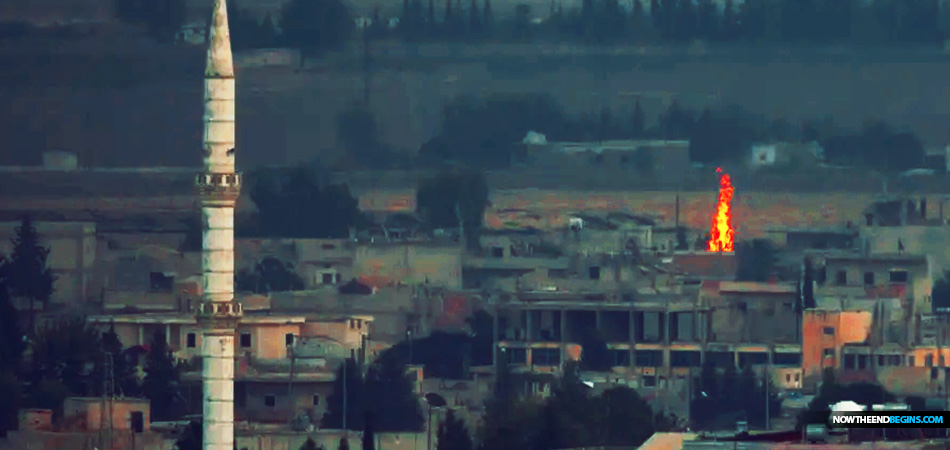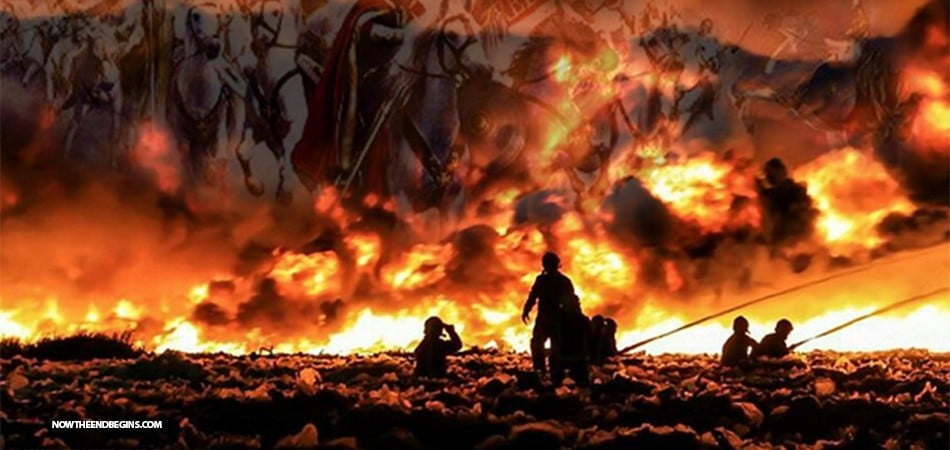
Syrian forces, most probably supported by Turkey, were seen attacking several key locations still held by Kurdish forces, violating the US-led ceasefire agreement in the region.
Once again, a military move by President Trump that was panned initially in carefully engineered outrage is turning out to be not so bad after all. Yes, Trump has ordered US troops out of Syria, fulfilling yet another one of his 2016 campaign promises, and Russian leader Vladimir Putin has stepped in to take control. But what exactly is he taking control of, and what order can a weakened Russia possibly make out of all this chaos?
"Therefore, thou son of man, prophesy against Gog, and say, Thus saith the Lord GOD; Behold, I am against thee, O Gog, the chief prince of Meshech and Tubal: And I will turn thee back, and leave but the sixth part of thee, and will cause thee to come up from the north parts, and will bring thee upon the mountains of Israel: And I will smite thy bow out of thy left hand, and will cause thine arrows to fall out of thy right hand." Ezekiel 39:1-3 (KJV)
Russia has a marginal economy at best, and a military that despite their endless bluster, is actually subpar when compared to most other nations and a joke when compared to the might of the United States. A long sustained control of the quagmire in Syria will not increase Russia's power but will actually weaken it. Russia does not have the money to do much of anything in Syria and Putin knows it. Besides, all this posturing is merely a dress rehearsal for the 'real thing' which comes during the last half of the time of Jacob's trouble.
Turkey Breaks Ceasefire Agreement With US, Attacks Northern Syria As Putin 'takes over'
FROM THE JPOST: These forces crossed the border from Turkey into northern Syria, according to the report, and are moving towards Ras al-Ain, a village in which the fighting hasn’t ceased since Friday, even after the ceasefire was signed.
Reuters, however, reports that the "fragile" ceasefire is holding along the Syrian border, though Turkish President Tayyip Erdogan is ready to continue the Syria offensive if the truce deal that was agreed upon is not implemented.
"We paused the operation for five days," said Turkish Defense Minister Hulusi Akar. "In this time, the terrorists will withdraw from the safe zone, their weapons will be collected and position destroyed. If this doesn't happen, we will continue the operation."
Erdogan also threatened the Kurdish forces in northern Syria, saying that they will "crush the heads" of the fighters if they do not withdraw in the 120-hour period designated by the ceasefire. He also said that he would speak about the deployment of Syrian government forces in a planned "safe zone" in northern Syria while speaking with Russian President Vladimir Putin next week.
READ MORE

THE BIBLE BELIEVER’S GUIDE TO THE TWO DIFFERENT WARS AS FOUND IN EZEKIEL CHAPTERS 38 AND 39
Is Putin the new king of the Middle East?
"Russia Assumes Mantle of Supreme Power Broker in the Middle East," proclaimed Britain's Telegraph. The article began: "Russia's status as the undisputed power broker in the Middle East was cemented as Vladimir Putin continued a triumphant tour of capitals traditionally allied to the U.S."
"Donald Trump Has Handed Putin the Middle East on a Plate" was the title of a Telegraph column. "Putin Seizes on Trump's Syria Retreat to Cement Middle East Role," said the Financial Times. The U.S. press parroted the British: Putin is now the new master of the Mideast.
And woe is us. Before concluding that Trump's pullout of the last 1,000 U.S. troops in Syria is America's Dunkirk, some reflection is needed.
Yes, Putin has played his hand skillfully. Diplomatically, as the Brits say, the Russian president is "punching above his weight."
He gets on with everyone. He is welcomed in Iran by the ayatollah, meets regularly with Bibi Netanyahu, is a cherished ally of Syria's Bashar Assad, and this week was being hosted by the king of Saudi Arabia and the royal rulers of the UAE. October 2019 has been a triumphal month.
Yet, consider what Putin has inherited and what his capabilities are for playing power broker of the Middle East. He has a single naval base on the Med, Tartus, in Syria, which dates to the 1970s, and a new air base, Khmeimim, also in Syria.
The U.S. has seven NATO allies on the Med – Spain, France, Italy, Croatia, Albania, Greece and Turkey, and two on the Black Sea, Romania and Bulgaria. We have U.S. forces and bases in Afghanistan, Iraq, Bahrain, Saudi Arabia, Qatar, Oman and Djibouti. Russia has no such panoply of bases in the Middle East or Persian Gulf.
We have the world's largest economy. Russia's economy is smaller than Italy's, and not a tenth the size of ours.
And now that we are out of Syria's civil war and the Kurds have cut their deal with Damascus, consider what we have just dumped into Vladimir Putin's lap. He is now the man in the middle between Turkey and Syria. He must bring together dictators who detest each other. There is first President Erdogan, who is demanding a 20-mile deep strip of Syrian borderland to keep the Syrian Kurds from uniting with the Turkish Kurds of the PKK. Erdogan wants the corridor to extend 280 miles, from Manbij, east of the Euphrates, all across Syria, to Iraq.
Then there is Bashar Assad, victorious in his horrific eight-year civil war, who is unlikely to cede 5,000 square miles of Syrian territory to a permanent occupation by Turkish troops. Reconciling these seemingly irreconcilable Syrian and Turkish demands is now Putin's problem. If he can work this out, he ought to get the Nobel Prize.
"
Putin is the New King of Syria," ran the op-ed headline in Thursday's Wall Street Journal. If Putin is king of Syria, it is because he was willing to pay the price in blood and treasure to keep his Russia's toehold on the Med and save his ally Bashar Assad, who would have gone under without him.
Now let's see how Putin likes his prize.
READ MORE
No comments:
Post a Comment